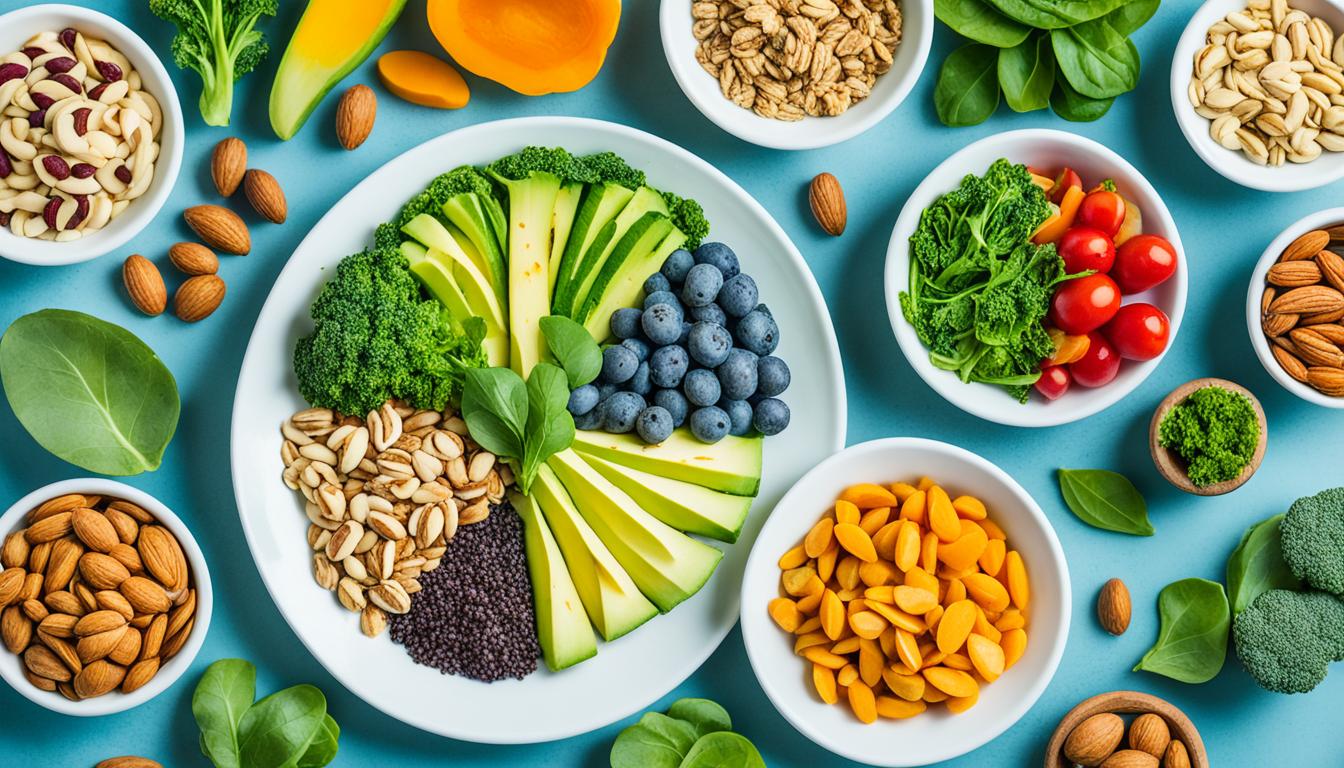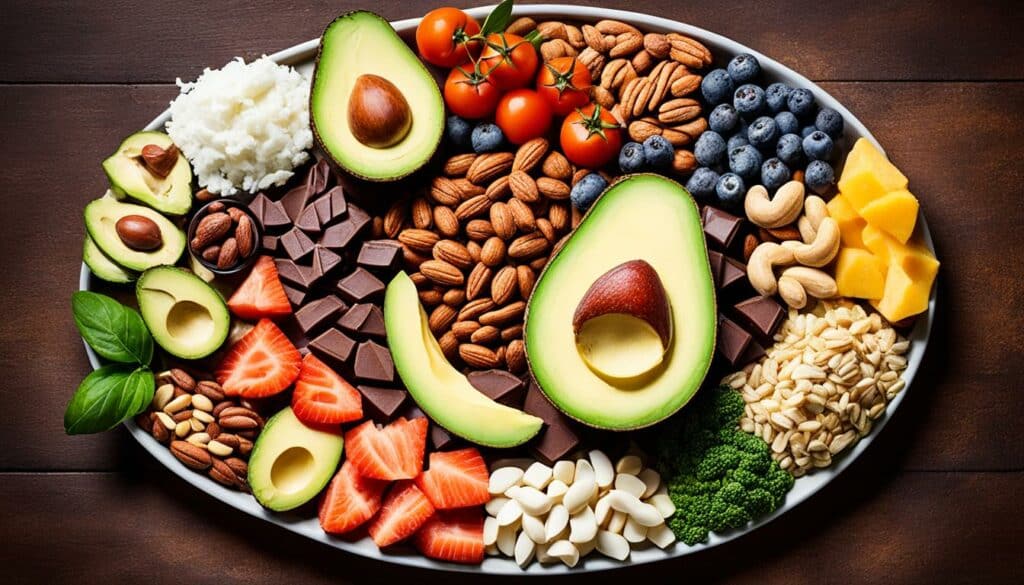Ketogenic Diet Food List: Your Essential Guide

Welcome to our essential guide to the ketogenic diet food list. Whether you are new to the keto lifestyle or looking for inspiration, this comprehensive list of keto-friendly foods will help you transform your meals and improve your health. By incorporating these foods into your diet, you can stay in ketosis and achieve the desired results.
The ketogenic diet, also known as the keto diet, is a low-carb, high-fat diet that has gained popularity in recent years. It focuses on consuming foods that are low in carbs and high in fats, which helps your body enter a metabolic state called ketosis. In ketosis, your body becomes a fat-burning machine, using stored fat as its primary source of energy.
To follow a ketogenic diet successfully, it’s essential to have a clear understanding of the foods you can eat. This comprehensive ketogenic diet food list will guide you in making the right choices. Let’s dive in and explore the best foods for a ketogenic diet.
Key Takeaways:
- Understanding the ketogenic diet is crucial before starting your journey.
- Focus on consuming foods that are low in carbs and high in healthy fats.
- Include a variety of keto-friendly proteins to meet your daily needs.
- Incorporate healthy fats from avocados, nuts, seeds, and oils into your meals.
- Choose low carb vegetables and fruits to add essential nutrients to your diet.
Understanding the Ketogenic Diet
The ketogenic diet has gained immense popularity due to its potential health benefits and effectiveness for weight loss. By understanding the basic principles of the ketogenic diet, you can make informed choices about your food intake and embark on a successful keto journey.
The key principle of the ketogenic diet is to consume low-carb, high-fat foods. This approach shifts your body into a state of ketosis, where it starts burning fat for energy instead of carbohydrates. This metabolic state allows you to achieve weight loss, improve mental clarity, and stabilize blood sugar levels.
When following a ketogenic diet, it is important to focus on foods that are low in carbohydrates and high in healthy fats. Incorporating keto-friendly foods into your meals can help promote ketosis and maximize the benefits of this eating plan.
The Benefits of High-Fat, Low-Carb Foods
The ketogenic diet emphasizes the consumption of high-fat, low-carb foods for several reasons:
- Weight Loss: By reducing carbohydrate intake, your body is forced to burn stored fat for energy, resulting in weight loss.
- Increased Energy: The high-fat content in a ketogenic diet provides a steady source of energy, keeping you energized throughout the day.
- Blood Sugar Control: The low-carb nature of the diet helps stabilize blood sugar levels, making it an effective option for individuals with diabetes or insulin resistance.
- Improved Mental Clarity: Many people report increased mental focus and clarity when following a ketogenic diet.
- Reduced Inflammation: The ketogenic diet has anti-inflammatory effects, which can help alleviate symptoms of chronic conditions like arthritis.
To help you get started on your keto journey, here is a low carb diet shopping list that includes keto-friendly foods:
| Protein | Fats and Oils | Vegetables |
|---|---|---|
| Grass-fed beef | Avocado oil | Broccoli |
| Chicken | Coconut oil | Cauliflower |
| Salmon | Olive oil | Kale |
| Eggs | Butter | Spinach |
This is just a sample of the many keto-friendly foods available. Incorporating a variety of proteins, healthy fats, and low-carb vegetables into your meals will help create a well-rounded, satisfying, and nutritious ketogenic diet plan.
Keto-Friendly Proteins
When following a ketogenic diet, it’s important to choose protein sources that are compatible with your nutritional goals. Incorporating high-quality proteins into your meals ensures that you stay in ketosis while providing the essential building blocks for a healthy body. Let’s explore the best foods for a ketogenic diet.
Meats
Meats are excellent sources of protein and are typically low in carbs, making them ideal for keto-friendly meals. Opt for grass-fed beef, which contains higher levels of omega-3 fatty acids and is free from added hormones and antibiotics. Other keto-friendly meat options include:
- Chicken: Skin-on, boneless chicken thighs are rich in protein and healthy fats.
- Pork: Choose fatty cuts like pork belly or pork tenderloin for added flavor and fat content.
- Lamb: Lamb is a delicious and versatile option that adds variety to your keto meals.
Poultry
Poultry offers a lean source of protein, perfect for those looking to limit their fat intake. Include the following poultry options in your keto meal plan:
- Chicken: Skinless chicken breasts are a lean source of protein.
- Turkey: Enjoy turkey breast or ground turkey for a low-fat option.
- Duck: Duck meat is rich in flavor and can be a tasty addition to your keto recipes.
Fish and Seafood
Fish and seafood are not only delicious but also provide essential omega-3 fatty acids. These healthy fats are beneficial for brain function and heart health. Include these keto-friendly options in your diet:
- Salmon: Rich in omega-3 fatty acids, salmon is a nutritious and tasty choice.
- Tuna: Canned or fresh tuna is a versatile protein option that can be included in various keto meals.
- Shrimp: Shrimp is low in carbs and high in protein, making it an excellent addition to your ketogenic diet.
Remember, when selecting proteins for your keto meals, opt for organic and grass-fed options whenever possible. These choices provide higher nutrient content and are free from harmful additives. Now that you have a range of keto-friendly protein options, you can create delicious and nutritious meals to support your ketogenic lifestyle.
Healthy Fats for Ketosis
Incorporating healthy fats into your ketogenic diet is crucial for achieving and maintaining ketosis. Not only do these high-fat low carb foods provide a satisfying and delicious element to your meals, but they also play a vital role in fueling your body for optimal health and weight management.
Avocados
One of the stars of the high-fat low carb foods list is the versatile avocado. Rich in monounsaturated fats, avocados not only provide a creamy texture to your dishes but also offer numerous health benefits. They are packed with fiber, vitamins, and minerals, making them a perfect addition to your keto-friendly meals.
Nuts and Seeds
Another excellent source of healthy fats are nuts and seeds. Options such as almonds, walnuts, chia seeds, and flaxseeds are not only low in carbs but also boast an impressive nutrient profile. These crunchy additions can be consumed as a snack or added to salads, yogurt, or even smoothies to provide a satisfying crunch and a dose of essential fats.
Cooking Oils
When it comes to cooking, choosing the right oils is essential for maintaining the ketogenic lifestyle. Opt for oils such as olive oil, coconut oil, and avocado oil, which are high in healthy fats and have a high smoke point. These oils not only add flavor to your dishes but also help you stay in ketosis.
“Incorporating healthy fats into your daily meals not only keeps you satisfied but also supports your body’s ability to achieve and maintain ketosis. These high fat low carb foods are a delicious way to stay on track with your ketogenic diet.”
Remember to moderate your consumption of these healthy fats, as they are dense in calories. While they are an essential component of your ketogenic diet, portion control is still important for maintaining a calorie balance.
By incorporating avocado, nuts, seeds, and healthy oils into your meals, you can create a wide variety of delicious and keto-friendly dishes. Experiment with different combinations and flavors to keep your meals interesting and enjoyable.
To learn more about other keto-friendly foods and explore recipes that incorporate these healthy fats, continue reading through our comprehensive guide.

Low Carb Vegetables and Fruits
When following a ketogenic diet, it’s essential to choose low carb vegetables and fruits that won’t disrupt ketosis. These keto-friendly foods are not only nutritious but also add variety and flavor to your meals. Let’s explore some of the best options:
Low Carb Vegetables:
1. Spinach: With its vibrant green leaves and rich nutrient profile, spinach is a great choice for keto. It’s low in carbs and high in vitamins A and C.
2. Broccoli: Packed with fiber and antioxidants, broccoli is both delicious and keto-friendly. It adds texture and color to your dishes while keeping carbs to a minimum.
3. Cauliflower: This versatile vegetable can be used to make rice, mashed potatoes, or even pizza crusts while maintaining a low carb count. It’s a favorite among keto enthusiasts.
4. Zucchini: Zucchini is not only low in carbs but also incredibly versatile. You can spiralize it into noodles, use it in stir-fries, or even make zucchini bread with keto-friendly substitutes.
5. Asparagus: Asparagus is a delicious addition to any keto meal. It’s loaded with vitamins, fiber, and antioxidants while remaining low in carbs.
Low Carb Fruits:
1. Avocado: While technically a fruit, avocados are a keto dieter’s best friend. They are high in healthy fats and fiber, making them an excellent option for satisfying cravings and boosting satiety.
2. Berries (e.g., strawberries, blackberries, raspberries): While fruits in general tend to be higher in natural sugars, berries are relatively low in carbs and can be enjoyed in moderation on a ketogenic diet. They are also packed with antioxidants and essential nutrients.
3. Lemons and limes: These citrus fruits are low in carbs and can be used to add flavor to your dishes or enhance the taste of your water, making them a refreshing addition to your keto lifestyle.
It’s important to note that portion control plays a crucial role in maintaining ketosis. While these vegetables and fruits are low in carbs, it’s still essential to track your daily intake and adjust accordingly. Additionally, understanding net carbs (total carbs minus fiber) can help you make more informed decisions when incorporating these foods into your ketogenic meals.
By including a variety of low carb vegetables and fruits in your keto diet, you can enjoy a range of flavors and nutrients while staying in ketosis. Experiment with different recipes and discover new ways to incorporate these keto-friendly foods into your meals.
Conclusion
Throughout this guide, we have provided you with a comprehensive overview of the ketogenic diet and its benefits. By focusing on high-fat, low-carb foods, you can achieve ketosis and improve your health and well-being.
To help you get started on your keto journey, we have created a comprehensive keto grocery list. This list includes essential pantry staples that will support your ketogenic diet. From healthy fats like avocados and oils to low-carb vegetables and keto-friendly proteins, these items are the building blocks of a successful keto diet.
By stocking your kitchen with these ketogenic pantry essentials and following our guide, you’ll have all the tools you need to create delicious and satisfying meals while staying in ketosis. Remember to practice portion control and track your macros to optimize your results. Embrace the keto lifestyle, and you’ll soon experience the numerous benefits it has to offer.